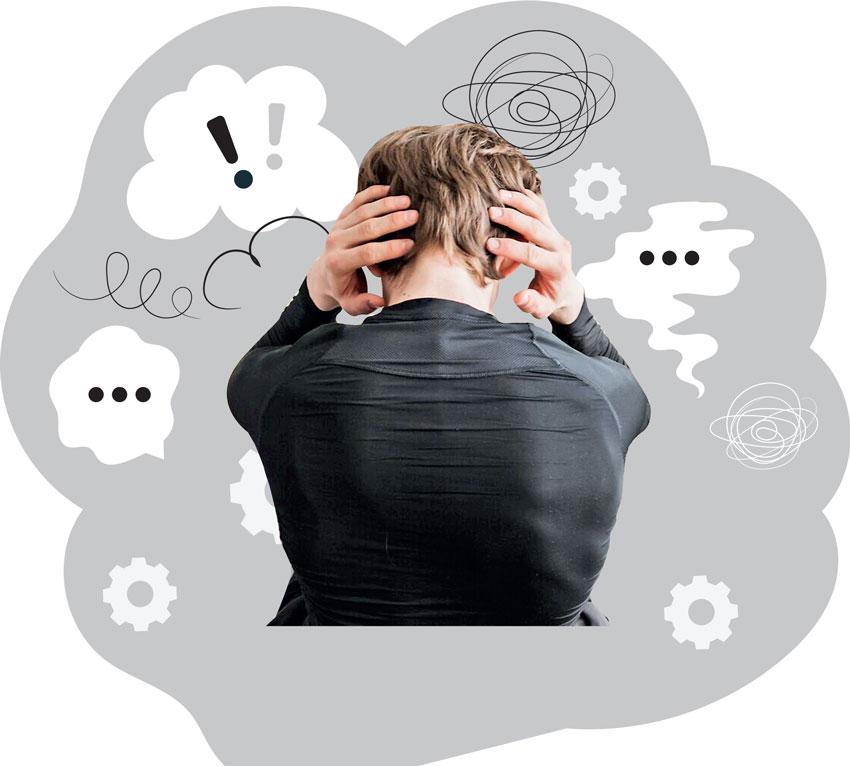

It is no secret that the last few years have been interlaced with crisis after crisis on a local and an international scale. 2019 marked the start of some of the most turbulent years Sri Lankans have had to face since the end of the 30-year-long civil war in 2009. Bombings on Easter Sunday, 14/11/2019, COVID and, most recently, Sri Lanka’s devastating economic crisis. Politics, the economy, health, human rights and the environment have all been “problem areas” globally, affected by both human and natural entities. Surviving crises is, in many ways, becoming a way of life. In an age of instant information, we have access to more data than ever before. Our devices create a sense of virtual proximity to events happening thousands of kilometres away. While this keeps us informed, the repeated consumption of negative data can be damaging; it is important that we care about world events, but it is equally important for us to care about our mental well-being. This begs the question: how is this recurrent exposure to negativity affecting us?
Heightened sensitisation
Learned helplessness
When people are repeatedly faced with negative events, and when they believe that they have no control over these events, they begin to feel that these situations are inevitable and inescapable, even after a solution becomes available.
According to Dr. Pushpa Ranasinghe, Consultant Psychiatrist at the National Institute of Mental Health (NIMH) and Team Leader of the National Mental Health Helpline, “What is harmful is the belief that you cannot do anything to improve the situation and that nothing is within your control. This means the situation can worsen because you are not actively trying to improve it. However, this perceived lack of control is only a belief; it is not necessarily true. There are still things that remain within your control. In a stage of learned helplessness, people tend to give up”.
Chronic stress
“When stress exceeds a healthy amount and becomes too much, a person can withdraw from situations and feel unable to handle it. When stress becomes chronic, the amount of corticosteroid hormones present in the body can get affected. This hormone imbalance can also affect a person’s physical health by worsening conditions like diabetes and high blood pressure”, Dr. Ranasinghe said.
Anxiety and depression
There has definitely been an increase in anxiety and depression since the peak of the COVID-19 pandemic and the economic crisis», said Dr. Sajeewana Amarasinghe, NIMH Consultant Psychiatrist.
“Symptoms like feeling low throughout the day, especially if it is worse in the morning, losing interest in things that usually bring you joy, losing motivation, constant tiredness and feelings of hopelessness and helplessness are telltale signs of depression. Anxiety can present in different ways, for example, palpitations, difficulties in breathing, headaches, body aches and issues with concentration and memory”, Dr. Amarasinghe said.
Maladaptive coping mechanisms
In stressful situations, people use different ways to deal with problems. “Some people use healthy coping strategies like problem-solving. Some people use maladaptive strategies to temporarily relieve themselves of the problem. This includes taking substances and deliberately harming oneself. This can also make people histrionic and irritable, especially towards people they are closest to”, revealed Dr. Ranasinghe.
The stats: more Sri Lankans seeking support
The number of calls received by the 24/7 1926 helpline was at its maximum during the lockdown in 2020, with a total of 28,508 calls. According to Dr. Ranasinghe, the call tally reduced slightly after this period, but it is currently on the rise again. The total annual number of calls since 2020 has been significantly higher than in preceding years.
The NIMH also has a 24/7 WhatsApp helpline. Dr. Ranasinghe stated that there has been a noticeable increase in the number of chats via WhatsApp. Most chats received are from the younger generation, particularly individuals between 16 to 23 years of age.
The doctors cited direct effects of crises such as unemployment, teens and young adults’ inability to continue their education and having to financially support their family instead, family members moving abroad, increased rates of domestic violence and having to change lifestyles to adapt to the new economic situation as the most common factors causing people distress lately. “A lot of people are anxious about the future”.
The flip side: desensitisation
Is tragedy becoming so normalised that our empathy is getting adversely affected? How are we able to read about a catastrophic event and scroll past or turn the page so quickly?
“When there is a lot of violence and it becomes a day-to-day occurrence, it is possible for people to gradually become desensitised to it, especially if they are not directly affected by the situation”, said Dr. Amarasinghe.
Dr. Ranasinghe also attributed this reduced emotional reaction to the focus on statistics when interpreting news. “If there is an emergency situation, we want to know how many people were affected or how many deaths have taken place, for example. More attention is given to the number”, she said.
Doomscrolling
The recently-coined term “doomscrolling” has been used to describe the tendency to continuously scroll through negative news, especially on social media. Fuelled by uncertainty in times of crisis, we may be inclined to repeatedly refresh our news feeds for updates. This behaviour became prevalent in 2020, during the peak of the COVID-19 pandemic, and has since become a negative habit that many individuals continue to perform, despite its damaging consequences.
“The overconsumption of media, in general, is not good, and this is especially the case if the information being consumed is negative. You need to find a healthy balance to stay informed without overdoing it”, said Dr. Amarasinghe.
How can we cope?
According to the doctors, there are certain coping mechanisms and strategies that people can use to strengthen their overall mental well-being and minimise the negative impacts of crises and stressful situations on their mental health.
- Recognise the source of your stress and your body’s reaction to stress.
- Recognise your personal contribution towards your stress, for example, overthinking, negative thinking patterns.
- Recognise your strengths, for example, supportive family and friends, intellectual capability, good personal qualities, and things to be grateful for.
- Set daily goals and be firm with reaching your goals.
- Avoid perfectionist expectations.
- Don’t self-medicate. If you feel overwhelmed and/or are experiencing symptoms of anxiety and depression, reach out to a professional.
- Surround yourself with positive people.
- Meditation and positive affirmations.
The doctors emphasised the importance of continuing your daily tasks and leisure activities, spending time with friends and family plus focusing on things that are within your control.
Resources:
24/7 NIMH Voice Helpline: 1926
24/7 NIMH SMS Helpline: 1926
24/7 NIMH WhatsApp Helpline: 0755551926

 It is no secret that the last few years have been interlaced with crisis after crisis on a local and an international scale. 2019 marked the start of some of the most turbulent years Sri Lankans have had to face since the end of the 30-year-long civil war in 2009. Bombings on Easter Sunday, 14/11/2019, COVID and, most recently, Sri Lanka’s devastating economic crisis. Politics, the economy, health, human rights and the environment have all been “problem areas” globally, affected by both human and natural entities. Surviving crises is, in many ways, becoming a way of life. In an age of instant information, we have access to more data than ever before. Our devices create a sense of virtual proximity to events happening thousands of kilometres away. While this keeps us informed, the repeated consumption of negative data can be damaging; it is important that we care about world events, but it is equally important for us to care about our mental well-being. This begs the question: how is this recurrent exposure to negativity affecting us?
It is no secret that the last few years have been interlaced with crisis after crisis on a local and an international scale. 2019 marked the start of some of the most turbulent years Sri Lankans have had to face since the end of the 30-year-long civil war in 2009. Bombings on Easter Sunday, 14/11/2019, COVID and, most recently, Sri Lanka’s devastating economic crisis. Politics, the economy, health, human rights and the environment have all been “problem areas” globally, affected by both human and natural entities. Surviving crises is, in many ways, becoming a way of life. In an age of instant information, we have access to more data than ever before. Our devices create a sense of virtual proximity to events happening thousands of kilometres away. While this keeps us informed, the repeated consumption of negative data can be damaging; it is important that we care about world events, but it is equally important for us to care about our mental well-being. This begs the question: how is this recurrent exposure to negativity affecting us?
